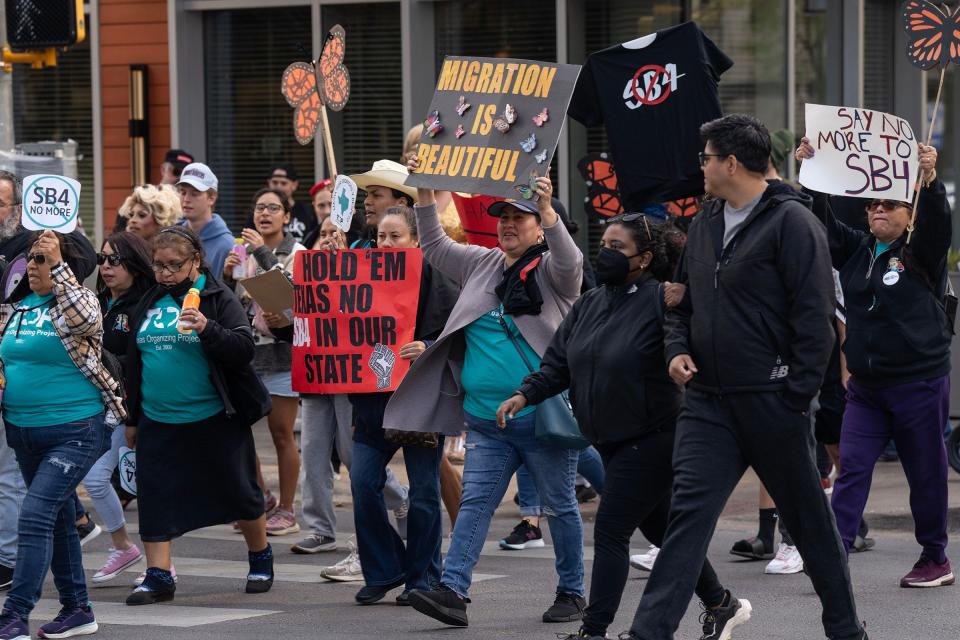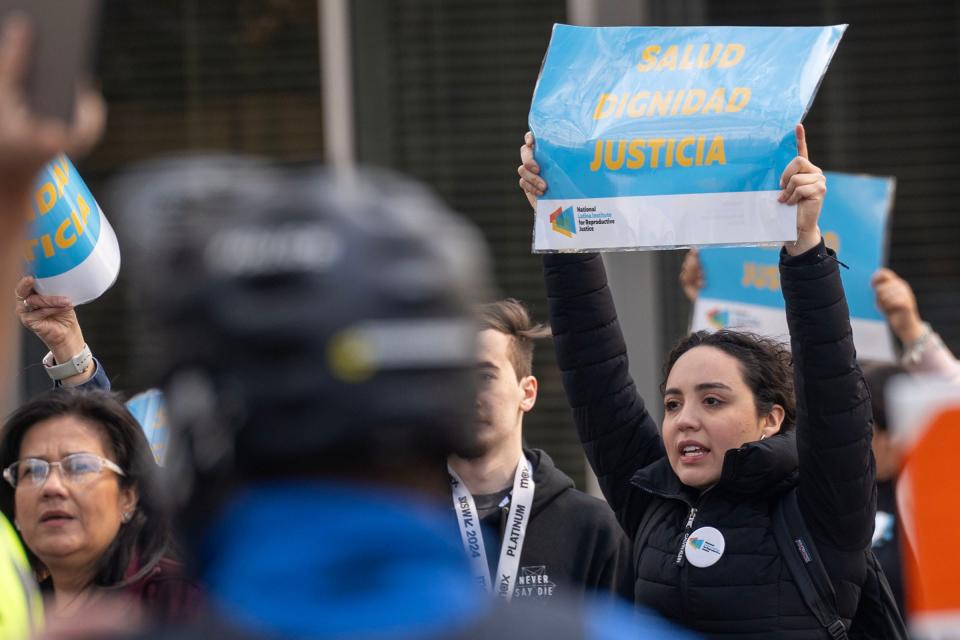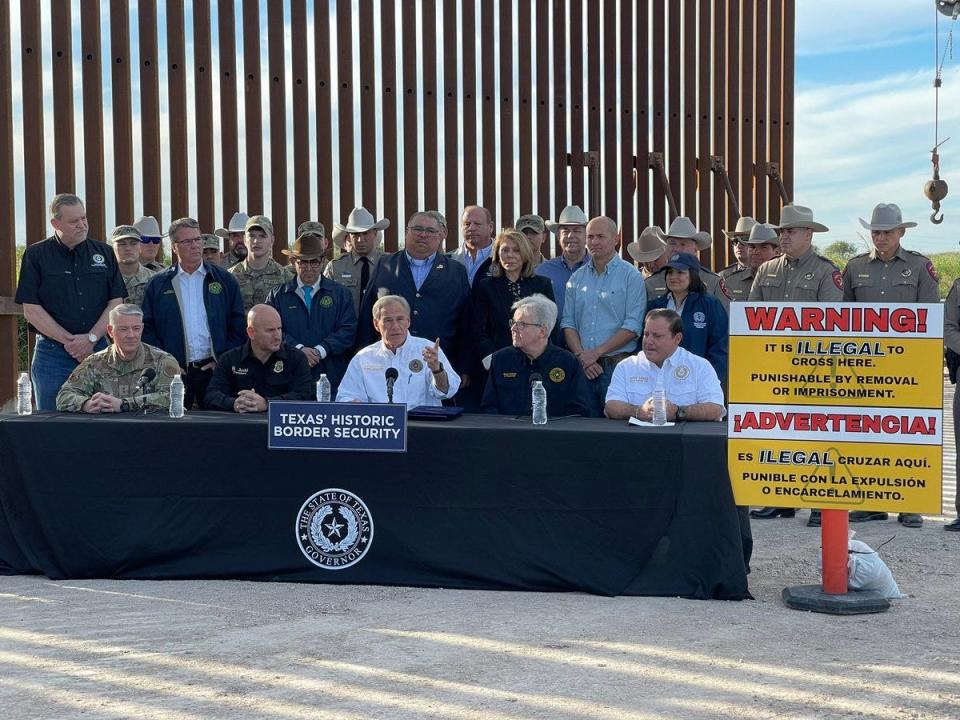US Supreme Court reverses decision on SB 4, allows Texas immigration law to take effect
- Oops!Something went wrong.Please try again later.
Update: On Tuesday evening, the New-Orleans based 5th Circuit Court of Appeals announced it would hold virtual oral arguments on SB 4 on Wednesday at 10 a.m.
The U.S. Supreme Court in a divided decision Tuesday is allowing Texas to begin enforcing its sweeping immigration law just one day after having extended a hold on the controversial measure, which authorizes state law enforcement officials to arrest, detain and deport people suspected of entering Texas from Mexico without authorization.
Initially taken up by the high court on March 4 after an injunction by Justice Samuel Alito, the Supreme Court's order Tuesday clears the way for SB 4 to take effect while the 5th U.S. Circuit Court of Appeals continues to weigh constitutional challenges to the state law.
“By enabling the Fifth Circuit’s disingenuous procedural jurisprudence, the United States Supreme Court undermines its own credibility," said U.S. Rep. Joaquin Castro, D-San Antonio, after the high court's decision. "The Supreme Court has opted to allow for a trial run of a constitutional crisis.

“SB 4 is an alarming state overreach that will likely lead to massive civil rights violations across our state. At a time of rising anti-Hispanic violence, this law puts a target on the back of anyone perceived by law enforcement to look or sound like an immigrant. While we wait for the Supreme Court’s final ruling, I’ll do everything I can to help Texans understand their rights and navigate the dangerous climate that Governor Abbott and state Republicans have created.”
Passed by the Legislature during a special session in November, SB 4 codifies a series of penalties for anyone suspected of crossing into the U.S. in Texas other than through an international port of entry. The penalties range from a Class B misdemeanor to a second-degree felony. The law allows state police to arrest migrants suspected of entering the U.S. illegally and to force them to accept a magistrate judge's deportation order or face stiffer criminal penalties.
Signed into law by Gov. Greg Abbott in December, SB 4 had previously been scheduled to take effect March 5, but its implementation was delayed after the U.S. Justice Department and civil rights groups sued the state over constitutional challenges.
"We still have to have hearings in the 5th circuit federal court of appeals," Abbott posted to X, formerly Twitter, following the ruling. "But this is clearly a positive development."

When Judge David Ezra of the U.S. District Court for the Western District of Texas on Feb. 29 issued the first hold on SB 4, he said the attempt to enforce immigration law falls under the federal government's established control of monitoring ingress and egress across the country's borders.
Texas Attorney General Ken Paxton, whose office has defended the law through the federal court system, called Tuesday's reversal to allow the law to take effect a huge win.
"Texas has defeated the Biden Administration’s and ACLU’s emergency motions at the Supreme Court," Paxton posted on X. "Our immigration law, SB 4, is now in effect. As always, it’s my honor to defend Texas and its sovereignty, and to lead us to victory in court."
In its ruling Tuesday, which is not a final order because the constitutional concerns are still being hashed out in federal court, three of the court's more liberal justices — Sonia Sotomayor, Elena Kagan and Ketanji Brown Jackson — disagreed with court's decision and dissented from the opinion allowing SB 4 to become active.
As part of the court's 6-3 decision, Justices Brett Kavanaugh and Amy Coney Barrett said the ruling is not based on the merits of SB 4, but that the court's involvement in considering the constitutionality of the law is currently premature.
Sotomayor said the order “invites further chaos and crisis in immigration enforcement.”

Immigration advocates involved in the lawsuit, in a joint news release, expressed frustration that the law was allowed to take effect, calling SB 4 the "most extreme anti-immigrant law ever passed by any state legislature in the country."
“Today’s decision is disappointing and threatens the integrity of our nation’s immigration laws and bedrock principles of due process," said Anand Balakrishnan, senior staff attorney for the ACLU’s Immigrants’ Rights Project. "But it is only preliminary and turned on the specific posture of the case. We’ll continue to fight against SB 4 until it is struck down once and for all.”
Concerns voiced in the lawsuit against SB 4 point to the state's inability to properly adjudicate immigration issues, that Texas' comparison of migrant entries to an invasion is inaccurate, and that those with lawful, federal immigration statuses could be subject to arrest and deportation to Mexico no matter their country of origin.
Similarly, Rebecca Lightsey, co-executive director of American Gateways, which is a party in the lawsuit, called the ruling another setback for civil rights advocates who are trying to help those fleeing persecution.

“We all recognize that our current immigration system is broken," Lightsey said. "It’s past time to take a look at realistic solutions that will help not only those coming and seeking protection, but also the communities that are receiving them.”
Currently, the 5th Circuit has scheduled an expedited consideration of SB 4, with virtual oral arguments in front of the New Orleans-based appeals panel scheduled for Wednesday. Previously, the case was set for consideration on April 3.
In a statement after the ruling, the Texas Public Policy Foundation, a conservative think tank and advocacy group based in Austin, celebrated the high court's ruling and thanked state lawmakers Sen. Charles Perry, R-Lubbock, and Rep. David Spiller, R-Jacksboro, along with Abbott for advancing the bill into law last year.
"The bill achieves three major ends: it defends Texas communities, it asserts Texas’ legitimate Constitutional powers, and it signals that the old era—in which the federal government acts more vigorously against states defending their citizenry than it does against the state-cartel threat from the southern border—is over,” Joshua Trevino, the foundation's chief of intelligence, said in the statement. "The bottom line is SB 4 is Constitutional and necessary for the defense of Texas against the state-cartel nexus that increasingly controls Mexico."
This article originally appeared on Austin American-Statesman: Supreme Court allows Texas immigration policy, SB 4, to take effect

